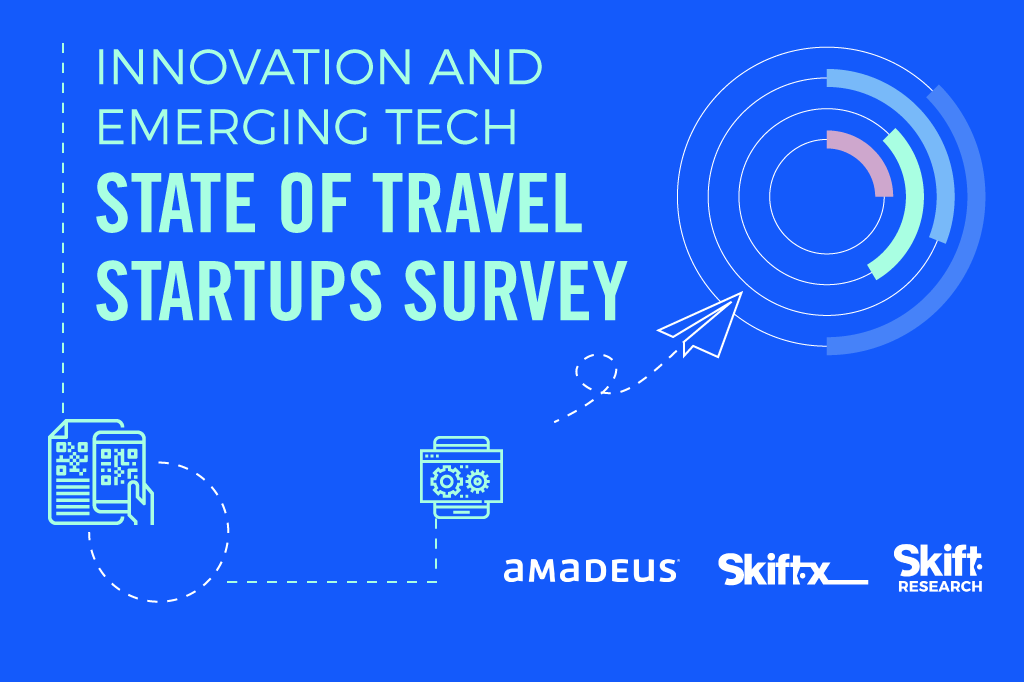Skift Take
Tech innovations like blockchain, AI and machine learning have the potential to change the way travel companies do business. Some already demonstrate significant promise in the effect they’ll likely have on the space, while others are still mostly hype. A new survey by Amadeus and Skift looked at how individuals in the travel startup sector actually feel about the utilities of these emerging tech tools.
This sponsored content was created in collaboration with a Skift partner.
Skift and Amadeus teamed to launch the Skift Survey: State of Travel Startups 2018. Check out all the results and view the full infographic here.
New tech innovations are allowing startups in the travel space to effectively compete in today’s crowded market, though some will have a larger influence than others. Recent research from Skift, conducted on behalf of Amadeus, surveyed several hundred individuals who work at travel sector startups about the tech innovations that they believe will have the biggest impact on their companies and the industry at large.
There are a lot of technology innovations that have caught the attention of those working in the travel startup space. However, a select group of tools are ahead of the pack. When respondents were asked to choose one technology that they felt would be most likely to change the future of their business, artificial intelligence (25 percent), blockchain (14 percent), and machine learning (12 percent) were the three that drove the most interest. Additionally, when respondents were asked to name the most useful innovations happening today, again, blockchain and machine learning got the top votes from respondents, followed by predictive analytics.
Blockchain
Blockchain has fueled a lot of excitement in the travel space, though it remains yet to be seen just how large of an effect it will have. However, it does at least offer the potential to upend many areas essential to the industry, such as data security, supply chain transparency, logistics, and more.
About 23 percent of survey respondents were willing to bet on blockchain as a major game changer in the near future, though, as one respondent described, blockchain’s potential depends on how far larger companies are willing to go with implementation. “Until supported by large travel companies, airlines and hotels, it’s going to be a steep task. But if supported, blockchain technology will have profound impact on the travel industry.”
Blockchain’s influence isn’t only dependent on larger companies. Because travel is one such industry where stakeholders work across multiple organizations to deliver a seamless customer experience, smaller companies will need to partner with larger players to adopt blockchain and build the required infrastructure to support the technology, a process which could take several years. Before then, blockchain’s imprint is likely to be somewhat limited.
Artificial Intelligence and Machine Learning
Artificial intelligence (AI) and machine learning are also two of the most talked-about topics in travel. Machine learning, a technology that is considered to be a sub-field of artificial intelligence, is expected to shape the future of AI. According to 60 percent of the survey respondents, machine learning will be an asset to the industry overall.
Machine learning arose from the desire to create software systems that theoretically “learn” to identify patterns in large data sets. That’s why machine learning has the potential to enhance complex models and algorithms that drive sophisticated predictive analytics systems. In travel, this most commonly impacts how companies can better understand customers’ decisions by tracking their moods and desires and making recommendations based on their preferences. As the technology gets more sophisticated, machine learning is likely to have an even more profound effect on the space. That said, it’s important to note that machine learning is likely to be more of an“incremental factor” for any typical startup’s success, not a core reason.
Messaging Platforms
Messaging platforms, and chatbots in particular, have also been on the radar of the travel industry for some time now. Offering consumers a level of real, live human-like interaction allows companies to streamline operations while still offering a branded, quality customer experience. However, there has been considerable speculation on the long-term potential of messaging platforms, as well as debates about whether they’re truly a game-changing tool, or just a “nice-to-have.”
Two-thirds of respondents in our survey expressed optimism about this emerging technology. However, a sizable portion of the respondents—46 percent—expect the market opportunity to deliver modest, incremental, functionality. An additional 24 percent said they’re looking forward to massive, positive opportunity for whole new categories of products and services driven by chatbot applications.
Even as the startup sector speculates about uses of chatbots in the future, the travel industry has already moved ahead with deploying chatbot technology. Major travel brands such as Kayak, Skyscanner and Expedia have each launched bots of their own. Meanwhile, other travel companies are increasingly looking at how messaging can assist the customer journey, while others are working to understand how messaging can help them better influence customer loyalty.
Augmented Reality
While the potential of augmented reality is promising, the industry has yet to fully work out potential uses and business models as they apply to travel. About 20 percent of survey respondents said they believed augmented reality was a “massive, positive opportunity for travel entrepreneurs,” compared to the 35 percent who felt that augmented reality could bring “modest, incremental functionality.” Nonetheless, as seen with the recent release of Apple’s ARKit software, augmented reality is likely to keep moving into the mainstream.
Check out the Amadeus for Startups infographic below to learn more about the latest tech innovations.
This content was created collaboratively by Amadeus and Skift’s branded content studio, SkiftX.
Have a confidential tip for Skift? Get in touch
Tags: amadeus, digital, startups, technology

